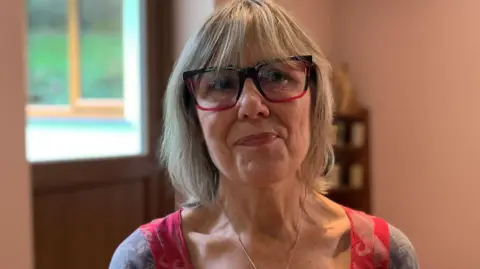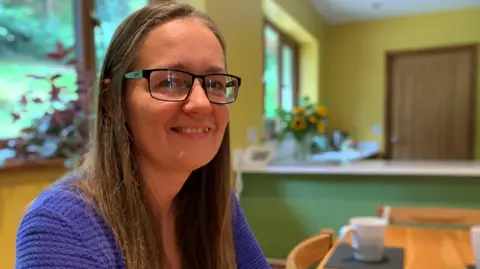Breaking News
‘It’ll break my son if they force him to leave his day centre’

Read more on post.
Garry OwenBBC Wales
 Diane White
Diane WhiteWhether it’s cooking, swimming or even shopping, Rory White feels comfortable at the day centre he’s called his second home for 17 years.
But “heartbreakingly” for the 39-year-old, who is disabled and has learning difficulties, his world is about to change – just because he moved seven miles (11km).
Mum Diane moved to a more suitable home for her son over a county border after her husband died of cancer seven years ago, but remained about 10 minutes away from Rory’s beloved day centre.
Now though, Ceredigion council says it has made the “difficult decision” to stop Rory from attending the day centre, despite Carmarthenshire council – where Rory now lives – saying it will pay for him to remain.

Canolfan Steffan, in Lampeter, is the day centre that Rory, who has cerebral palsy, attends for three whole days a week and is central to his life.
“If he had to move, it would break him,” said Diane.
“He knows everyone there. To be stopped from accessing the service would be heart breaking for him.”
Diane and Rory moved home in 2018 from Betws Bledrws in Ceredigion to a village called Pencarreg, which is over the border in Carmarthenshire.
“This bungalow was perfect for Rory and me, it had everything we needed,” added Diane. “And it was only a couple of miles away from Canolfan Steffan.”
 Diane White
Diane WhiteCarmarthenshire council has funded his place at Canolfan Steffan since he moved to the county and is willing to continue to pay for him – but his mum has now been told by Ceredigion council that the arrangement is coming to an end.
“Everything has worked perfectly for years,” said Diane.
“But now that has just gone out of the window and I just can’t understand why.
“He is part of the community in Lampeter.”

The proposed changes are upsetting Rory.
He told the BBC: “I’ll miss my friends, and the staff and walking around town and stuff. This isn’t good at all.”
As well as activities like making his favourite dish or going for a swim, Rory loves just doing the simple things with the helpers at Canolfan Steffan, like socialising or going for a stroll around town.
“The uncertainty makes him really worried,” said his sister Abby. “And I then in turn worry more about him.
“I am concerned about how Rory is feeling while this whole situation is happening, even before his access is stopped.”
The family understand that Rory could be offered a place at a centre near Carmarthen, almost an hour’s drive away in west Wales, but said the situation was very uncertain.
Rory does not just have his family’s support, but political support locally too.
The chair of Ceredigion council said she was “very concerned” about the decision taken by her own authority and said she was supporting the family.
“In Lampeter, the schools locally all come here to the secondary school, and there is a lot of cross border co-operation between the two counties,” said Ms Ann Bowen Morgan.
“We can’t understand what’s going on here.”
Ms Bowen Morgan, who lives locally in Lampeter and represents the town, said she would continue to ask questions to the council and its cabinet.
The local MP Ann Davies, who represents Caerfyrddin in Westminster, has said both authorities should get together and agree on the best way ahead for Rory.
“This is a problem we are seeing across Wales is that there are a lack of services, especially in rural areas,” said Leandra Crain from Disability Wales, the national association of disabled people’s organisations in Wales.
“Local authorities have a large area of land but services aren’t spread across them equally so some people will have to travel quite a distance to be able to access services.”
The Welsh government said local authorities had a “legal duty” to meet “eligible care and support needs” and urged councils to work together when people move across boundaries to avoid “unnecessary disruption”.
Carmarthenshire council said its community learning disability team had met Rory and his family to review his needs.
“Our team are currently exploring options based on the information gathered during Rory’s review to commission a suitable alternative provision that meets Rory’s needs,” the council said in a statement.
Ceredigion council said it was a “difficult decision” but that it could no longer offer Rory a place at the day centre because of “restrictions on our resources for specialist services”.
“We have to concentrate on ensuring that those who are resident in Ceredigion have the services they require,” Ceredigion council added.
“We therefore have to bring placements commissioned by other local authorities to an end.”














